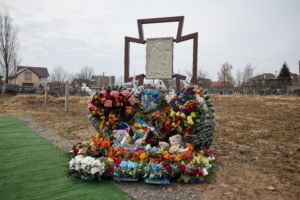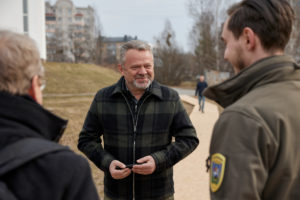27 March 2023
Estimated reading time: 06 minutes
27 March 2023
(BUCHA, Ukraine) – The streets are clean and it looks for all the world like a normal town. A high-school sports stadium on the left; a hyper-market stuffed with consumer items on the right. But life in Bucha is anything but normal. The thoroughfares may be quiet but there’s a strange roar in the air, a faintly audible buzz one can hear just above the gentle whisper of the forests that surround Kyiv, separating the Ukrainian capital from the southern steppe. It is the distant sound of war crimes committed here only one year ago, crimes that are still a palpable presence in this quiet suburb of 28,500. And it is a wake-up call for the many who hear it – a clarion appeal to the challenge faced by democracy – pinned, as it is, between growing unity around the values of free choice and self-determination and horrific death at the hands of dangerous men with heavy weapons, digitally-enhanced propaganda and threadbare arguments for imperial conquest.
The Russians occupied Bucha for one month, ordering villagers to stay inside their houses and threatening to shoot anyone who came out. And shoot them they did. Volodymyr Brovchenko borrowed a bike from a neighbour; when he tried to return it, he was summarily shot, his body left lying in the street for a month (a relative was also shot when he tried to retrieve the body). Another pair of brothers were shot returning from a dog shelter where they had gone to make sure the animals had enough food. Today, these crimes are commemorated in a giant field on the edge of town near the Church of St Andrew Pervozvannoho, only recently opened, at the site of a mass grave where summarily executed civilians were hastily dumped when it was time for the Russians to leave. 458 people were found in two trenches – some of them still not identified. All have been re-buried. The process took two months to complete.

Site of the mass grave in Bucha, Ukraine
What, then, happened in Bucha? The Russians intended to make the town a base for the coming attack on Kyiv, located a mere 33 kilometres away. They commandeered the house of the local mayor, Anatoliy Fedoruk, who cleverly survived by pretending to be the gardener in his own home when the Russians first arrived (he spent a harrowing month living underground in the town he was elected to lead). Today, Mayor Fedoruk has a new job – greeting the steady stream of VIPs and heads of state who come to his town to lay wreaths and listen to that quiet roar which, I swear, still haunts Bucha. His message was a simple one: “The occupiers must be pushed back to Mozhaysk (a city outside of Moscow),” he says, making eye contact with his visitor to ensure his point is felt and understood. “It is impossible to forget what the Orcs [the battle name for invading Russians, taken from J.R.R. Tolkien’s Lord of the Rings trilogy] did here. It will be remembered for hundreds of years.”

Anatoliy Fedoruk, Mayor of Bucha
Mayor Fedoruk, 50, says that 37 of his fellow mayors are currently held in prison in the Russian occupied territories of East Ukraine. The Russians haven’t killed them. Instead, they are holding them hostage and trying to sell them back for ransom – like in the Middle Ages. His worry is not that the Russians will return to Bucha but that the world will slowly lose interest. He believes – as do many – that this insane Russian war can only end one way – with Russian withdrawal. And a war crimes tribunal. And full liberation of the lands the Russians have tried to steal. And an effort to stick precisely this point – that 19th century imperialism died a century ago.
Orcs? That’s what the Ukrainians call the Russians and for a reason. Nationality in this part of the world is a complicated affair. People not only speak Russian everywhere – many of them were raised speaking it and still speak it in their families and with their friends. Mikhail Gorbachev, for one, was half Ukrainian (his mother, Maria Gopkalo, was born in Chernihiv, Ukraine and migrated to the southern Russian steppe before marrying there). The future Soviet leader grew up speaking Ukrainian – a fact that was long suppressed in his official biography. These days, many Ukrainians speak a mix of languages, often slipping from Russian to Ukrainian and back in the same conversation. This is especially true in Kyiv, where most people over 30 were schooled in Russian. The whole thing renders Vladimir Putin’s point that this war is to defend the rights of “Russian-speaking people” completely moot and more than faintly ridiculous. To the contrary, no one has done more to damage the long-term viability of the Russian language and Russian culture than Vladimir Putin. No one has done more to make sure that he and his “Orcs” will never be welcome anywhere in the world no matter how many tanks they field or civilians they shoot.

Voksalnaya Street. Then and now
The importance of the Ukraine war cannot be overstated. There, perhaps not for the first time, an old-school empire is using the tools of war to harass and torment a people whose land they covet. Genocide is in the air. Many of the crimes – including the nightly attacks on Kyiv – are aimed squarely at the civilian population, with apartment buildings full of sleeping civilians inside of them. One building – a recently-opened apartment block on Hostomelske Chaussee – was bombed with phosphorus on the way out of Irpin. This was not to attain a military objective. It was overt retribution against a civilian population that had rejected Russian war aims, working with the Ukrainian army to stop the flow of troops, tanks and rifles at the gates of Kyiv. The Russians firebombed the building – using weapons whose use is banned by the Geneva Conventions – on the way out of town.
What a calling card to leave behind.
We owe it all to the Ukrainians. And I look forward to visiting Bucha again in more peaceful times. And to thanking them for standing so tall when so much was expected of them. Slava Ukraini.
Paul Hofheinz is president and co-founder of the Lisbon Council.
Download in PDF